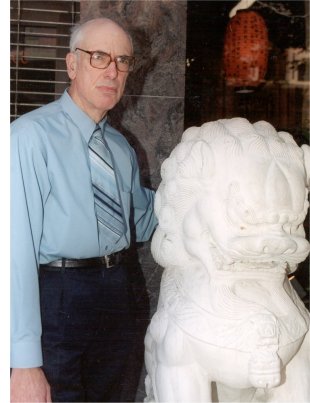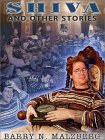 |
|
 |
 |
THE NEWSPAPER OF THE SCIENCE FICTION FIELD
 |  |

|
 |

|
Barry Malzberg: Dismantling SF |
April 2002 |
|
Barry N. Malzberg's science fiction career began an agent for the Scott Meredith Literary Agency in New York in 1965, and he has seen the field from many angles, as reader, writer, editor, agent, and critic. He began publishing short stories in 1967, novels in 1970, and became known as a prolific writer of fiction that took a sardonic view of the meaning - or lack thereof - in individualsí lives and undertakings, to the point of occasionally being labeled anti-SF in his outlook. Notable novels include Beyond Apollo (1972), winner of the first John W. Campbell Award; Herovit's World (1973); Guernica Night (1975); Galaxies (1975); and The Remaking of Sigmund Freud (1985). His many short story collections include The Passage of the Light: The Recursive Science Fiction of Barry N. Malzberg (1994) and In the Stone House (2000). His collection of critical essays The Engines of the Night: Science Fiction in the Eighties (1982) won a Locus Award. He lives with his wife Joyce in Teaneck, New Jersey.
|

Photo by Beth Gwinn
|
Excerpts from the interview:
 ĎĎ...[I]f you keep on and ask me what I love about science fiction, Iíll reply: I think science fiction is, along with jazz, Americaís great contribution to world culture — itís as great as jazz, as profligate, as wonderful. As David Brin has said, youíve got to look to the 19th-century Romantic Movement in music and literature to find something of comparable importance.
ĎĎ...[I]f you keep on and ask me what I love about science fiction, Iíll reply: I think science fiction is, along with jazz, Americaís great contribution to world culture — itís as great as jazz, as profligate, as wonderful. As David Brin has said, youíve got to look to the 19th-century Romantic Movement in music and literature to find something of comparable importance.
ĎĎScience fiction is a magnificent instrument. I donít really hate anything about it. What disappoints me about it is that most of its practitioners have not been as good as they should have been, and the fact that science fiction emerged as a genre of commercial literature, forced to make adjustments and compromises to accommodate a mass audience, which was not to its aesthetic interest. I donít segregate myself from those who do so. The readership has contributed to this debasement, I suppose, but any readership does. Norman Spinrad said the worst thing about science fiction is fandom. I donít agree with that at all. Fandom has destroyed some authors — Theodore Sturgeon was brought down by the easy temptation of fandom, the need to be a hero. He is the saddest example, but surely not the only one. There are many deleterious influences surrounding science fiction, but all things considered, I think it has done remarkably well.íí
*
ĎĎI think Iíve written about ten million published words of fiction, though Iíve long since given up counting it. The last four or five years have not been particularly productive. I had what I call a Ďgreat autumnal runí between 1990 and 1993, publishing about a hundred short stories (alone and in collaboration with Kathe Koja), which I think are the best work I ever did. I did them quickly, I did them well and I believe at a new level of accomplishment. And then that was done. Since September of í93, there have been the usual ventures — introductions, little essays for Ellen Datlowís Event Horizon — but very little fiction, somewhere between five and ten short stories. I like to feel that Iíll be doing some more.íí
*
 ĎĎAs Thomas M. Disch pointed out, science fiction conquered the world. Maybe, having won, we have to dismantle the war machine and send the colonels home, pension off the troops, and find something else to do. It did its job too well, leaving behind the detritus of science fiction — a slowly, inexorably aging audience not being replaced, and a real feeling of recession. It seems to be in its twilight. But I have to remind myself, I donít think it feels that way to David Brin, say, or Gregory Benford or Kevin J. Anderson. A critic said of an old and nearly incoherent John dos Passos, that he Ďhad confused an old manís deterioration with that of the world.í I donít want to do that.íí
ĎĎAs Thomas M. Disch pointed out, science fiction conquered the world. Maybe, having won, we have to dismantle the war machine and send the colonels home, pension off the troops, and find something else to do. It did its job too well, leaving behind the detritus of science fiction — a slowly, inexorably aging audience not being replaced, and a real feeling of recession. It seems to be in its twilight. But I have to remind myself, I donít think it feels that way to David Brin, say, or Gregory Benford or Kevin J. Anderson. A critic said of an old and nearly incoherent John dos Passos, that he Ďhad confused an old manís deterioration with that of the world.í I donít want to do that.íí
*
ĎĎIíve read here and there in current science fiction, but I canít really say Iíve kept up with the field. In the í60s, I would say, ĎMe, Iím young, Iím hot, Iím the coming thing — why donít they read me? Why donít those bastards out there, like Sturgeon and Asimov and Moskowitz, read me? Why do they resist what Iím doing?í Well time, as always, has had its joke. Iíve become Sam Moskowitz. I am linked to the science fiction which influenced and shaped me, and to the work of my contemporaries. Most work from past 1980 I donít respond to emotionally. I never understood Sam Moskowitz so well as in the last four or five years. All the bad things I said about him, I apologize, because in all of us thereís a Sam Moskowitz screaming to be born and if weíre granted a biblical number of years he will emerge.íí
The full interview and biographical profile is published in the April 2002 issue of Locus Magazine.
|
 |

|
 |

